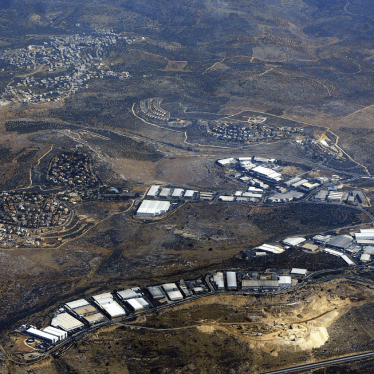What’s the connection between manufacturing Hanukah candles and dispossessing farmers of their land? How does an Israeli company that sells Jerusalem stone make Palestinian quarry workers lose their jobs? The answers can be found in the new Human Rights Watch report Occupation Inc., which documents the involvement of businesses in human rights violations in the West Bank, and recommends that they stop doing business with or in settlements.
International law prohibits business activity that furthers unlawful activities such as settlements in occupied territory. Yet that is happening every day in the West Bank, including East Jerusalem, where 1,000 factories operate, and 93,000 dunams (9,300 hectares) of farmland are cultivated in 237 settlements. While these businesses do employ Palestinians, about 26,000 of them, they nevertheless take a heavy toll on the Palestinian economy and on Palestinian life in the area. Settlement businesses rely on illegal seizure of Palestinian land under policies that discriminate against Palestinian businesses in favor of Israeli ones, and a legal void that leaves workers vulnerable to all kinds of abuse.
Israeli settlements are able to offer jobs to Palestinians, because they thrive on resources taken from Palestinians and are subsidized by a government that restricts Palestinian economic activity, making it difficult for Palestinians to create their own jobs.
Businesses also have responsibilities under international human rights standards, such as the UN Guiding Principles on Business and Human Rights. At a minimum, they should not contribute to or facilitate violations of human rights or international humanitarian law. Human Rights Watch is not calling for a consumer boycott but has concluded that operating a business in the settlements without being complicit in serious abuses of human rights is impossible.
Exports from settlements account for less than one percent of Israel’s overall industrial export, but the deliberate opaqueness surrounding the origin of Israeli products can taint all Israeli exports. In preparation for the report’s publication, we met with Israeli business owners who expressed concern over the harm caused to the country’s entire economy as a result of the image created by the few businesses that operate in the settlements. Moving Israeli business out of the settlements would remove this shadow looming over Israel’s economy.
Closing settlement businesses and stopping the restrictions they impose on the Palestinian economy could also benefit Palestinian farmers, shepherds and business owners, as well as their workers. The seizure of Palestinian land, the restrictions on movement and construction, the refusal to license Palestinian businesses and other measures taken to promote Israeli settlements cost the Palestinian economy more than $3.4 billion annually according to the World Bank. Since 1994, not a single license application from a Palestinian to operate a new quarry has been approved by the Civil Administration and between 2000 and 2012, it refused 94 percent of Palestinian building permit applications in Area C, which spans 60 percent of the total area of the West Bank. Yet Israeli quarries continue to receive licenses and now out-produce Palestinian quarries three to one, and the Israeli government actively promotes and subsidizes construction in Israeli settlements.
Corporations globally are becoming increasingly aware of their responsibility to safeguard human rights, and as a result, to reassess how their operations contribute to violations. This trend is coming to the West Bank and businesses should recognize their human rights responsibilities there and get out of the business of settlements.









